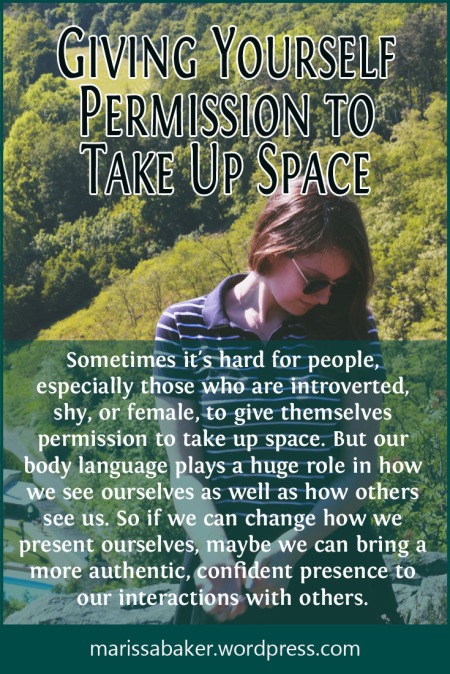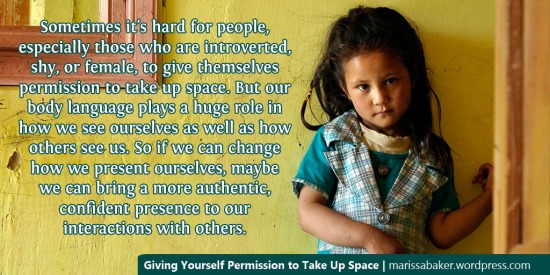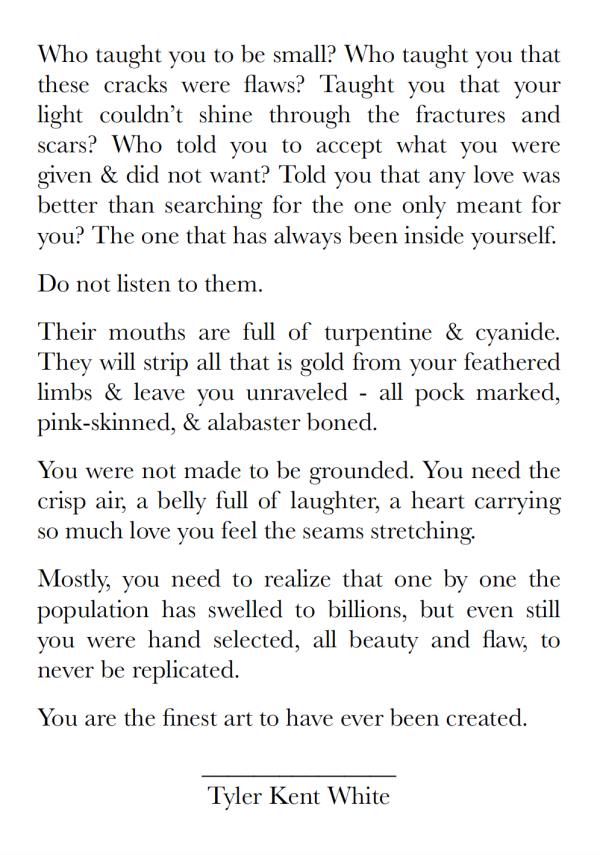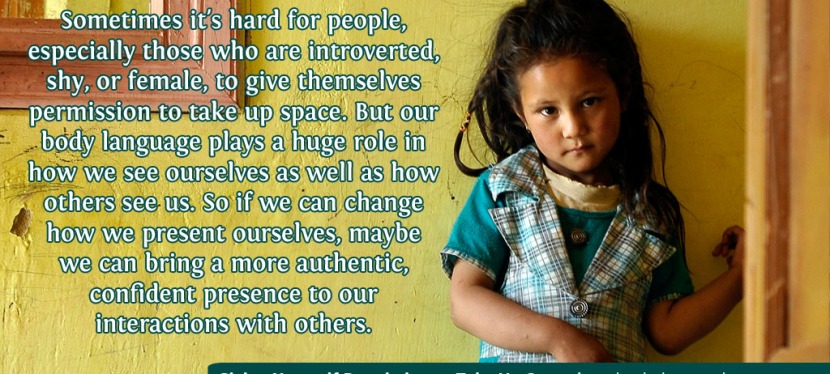I’m 5 feet 6 inches tall (about 168 cm for my readers on the metric system). When I was a teenager I decided that was about 3 inches too tall for some reason ostensibly connected with Joe Hardy (yes, the fictional character. I know — I needed more real friends). That’s not the only reason I do things to make myself look smaller, but it’s one of the stranger ones. In general, though, being taller than other people simply makes me feel awkward. And even though I’ve explored that feeling before in a creative non-fiction class in college, I really wasn’t sure why.
Recently, I’ve been asked why I use body language that makes me look small. That question made me take another look at why I’m doing what I do. I hunch my shoulders. I sit in corners of sofas. I cross my arms and legs or ankles. Or I have my hands together nervously fiddling with my fingers. Part of this is unconscious but I’m often aware of it as well. I know I make myself smaller and sometimes I do it on purpose, especially if I feel nervous or threatened. I suppose I’m saying with my body language, “Don’t notice me. Don’t hurt me.” And this sort of thing has become instinctive for me.

One of my more vivid childhood memories is of being enrolled in a summer school program and hiding under the playground equipment from the other kids. My experiences there played a large role in why my parents chose to homeschool. In some ways, that scared little girl is still part of me and hiding is still my default move. But, as someone recently reminded me, fear isn’t a good way to live your life. I feel like it’s time for a change.
Leveraging Your Nonverbal Power Dynamics
Back on the topic of body language, there’s a TED talk by Amy Cuddy that’s relevant to today’s post. She studies nonverbal expressions of power and dominance. Both animals and people “open up” and take up space when they’re feeling powerful and when they have power. In contrast, people who feel powerless “close up, we wrap ourselves up, we make ourselves small, we don’t want to bump up to the person next to us.” She also says that we “complement the other’s nonverbals,” meaning that if we’re around someone being really powerful we tend to close up (which I do all the time becasue I assume other people are more powerful than me). Here’s the video if you have an extra 21 minutes to watch it:
When she’s talking about how students sit in classrooms, I recognize myself in the type who made herself small and barely raised her hand. I thought it was social anxiety. Amy Cuddy says that’s how most women sit in classrooms becasue they feel “chronically less powerful than men.” I’m thinking for me it was both. I think of myself as small, easily intimidated, and even helpless at times. And because I think that, I act like I am. Which ties-in with the question Cuddy asked in her research: since we know that nonverbal cues govern how others see us, “Do our nonverbals govern how we think and feel about ourselves?” In other words, “Can our bodies change our minds?”
Her research found that the answer to both questions in “yes.” After having people adopt positions of high and low power for two minutes she and her research partner measured hormonal changes. The people in high-power poses experienced a 20% increase in testosterone (the dominance hormone) while those in low-power poses experienced a 10% decrease. Also, people in high-power poses had a 25% decrease in their cortisol levels (the stress hormone) while those in low power poses had a 15% increase. Just two minutes configures your brain to be “assertive, confident, and comfortable” for high-power poses “or really stress-reactive and feeling sort of shut-down” for low-power poses. And when they took these results into further tests looking at how people perform in job interviews, they found that those who had done power posing before hand performed better and that people wanted to hire them.
Bringing Your True Self Into The World
Cuddy says the sorts of things that are affected by power posing have to do with presence and bringing your true self into a situation. We introverts often complain about the cult of personality and how the loudest person in the room gets all the attention, wishing people would pay attention to the quiet ones for once. But this research indicates it’s not so much about being extroverted as it is about finding the confidence to show up with our own presence and bring our true selves into a situation. That’s probably easier for extroverts (just as in classrooms it’s typically easier for men), but that doesn’t mean it’s out of an introvert’s reach.

Still, I don’t like adopting poses of power. Partly because they feel sloppy or “unladylike” (one aspect of power posing is spreading out and taking up space and I’m sure I’m not the only little girl who grew up having older ladies lecture her about keeping your legs together). Part of it’s just because it feel so unfamiliar or uncomfortable, which I suppose could train myself out of. But also partly because I’m scared to be seen as powerful. This is something Cuddy talks about — the feeling of being an imposter or thinking “I’m not supposed to be here.” I worry that if I act powerful people will find out that I’m not. Which brings back my fear that I’ll have a panic attack in front of people.
Near the end of her talk, Cuddy talks about the importance of “Fake it ’til you become it” (rather than just “Fake it ’til you make it”). She challenges people to try power posing before their next important, evaluative situation so they can empower themselves to really show who they are. As it just so happens, I’ll have a chance to do that later tonight since I’m being interviewed for a podcast (that’s all I’m going to say about that right now, but it’s very exciting and I’ll share links and stuff with you shortly).
Who Taught You To Be Small?
While I certainly see the benefits of power posing to bring down stress and feel more confident before entering a situation, I still don’t really see myself ever habitually doing that in front of people. I want to become comfortable taking up my own space, but I don’t want others to ever feel like I’m pushing them out. I don’t want to be seen as in competition with them. And one position Cuddy described as low-power (elbows on table leaning forward) is one of my default listening postures. I want to be seen as inviting and engaged, not intimidating (which, believe it or not, I was once told I am).
So those are some of the thoughts running through my head when I’m thinking about no longer minimizing my own presence. Still, I do want to be comfortable asserting myself in more situations. I have too many regrets about things I didn’t say or do and people I didn’t engage with because I was too busy trying to go unnoticed. I want to invite those of you who’ve been making yourself small for far too long (whether your introverted, extroverted, male, female, shy, boisterous, or whatever) to give yourself permission to take up space. Bring your presence into the world. It needs you.

This was beautiful! I really like this post. I too used to believe I was 3 inches too tall. A bit funny, all my friends at the time were barely 5 ft, so I simply needed to hang out with some taller friends. Presto, I was suddenly the small one.
Permission to take up space is an issue many people wrestle with.
LikeLiked by 1 person
And dont wait till you are 50! That is the year I danced at my sons wedding, not just the mother son dance but with people on the dance floor, and it was fun. I decided that I’m tired of sitting at the “purse table”.
LikeLiked by 2 people
Wow! This is great stuff … when I was writing for the newspaper I was always making myself invisible … making myself take up a tiny corner … just here to observe … but being short (5’2″) I had to learn to make myself taller for teaching and confrontations … Great article! So much to think about! (by the way, you know 5’6″ is the “perfect” height for a woman, right?)
LikeLiked by 1 person
I’m about the same height but enjoy wearing heels; I’ve always wanted to look taller. 😉
I’ll have to watch the TED talk; I know that you ‘educate’ people how to treat you based on nonverbal cues, and it’s important never to show submissiveness, but I tend to zone out / not pay as much attention to that as I should. 😛
LikeLiked by 1 person